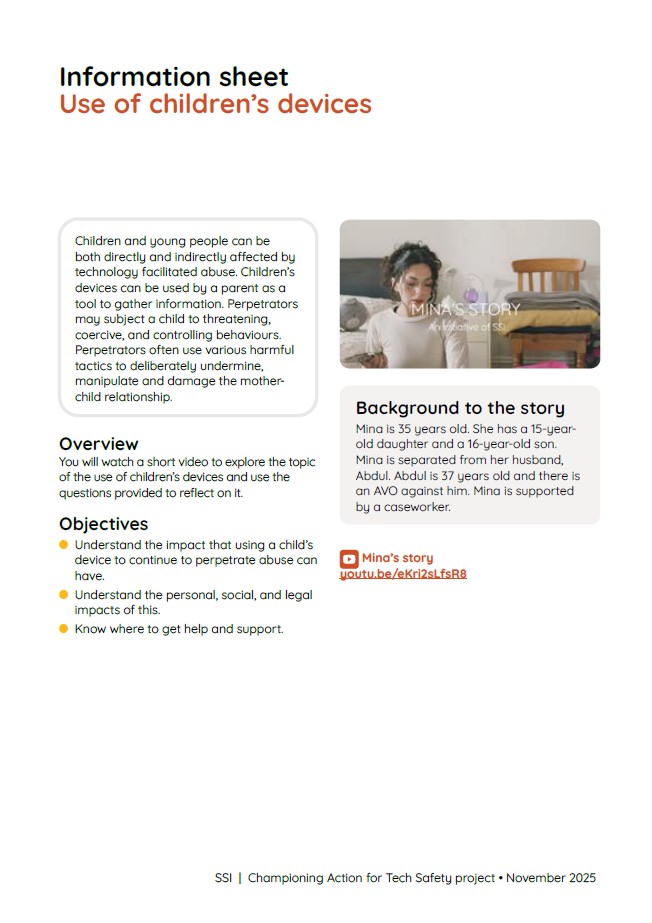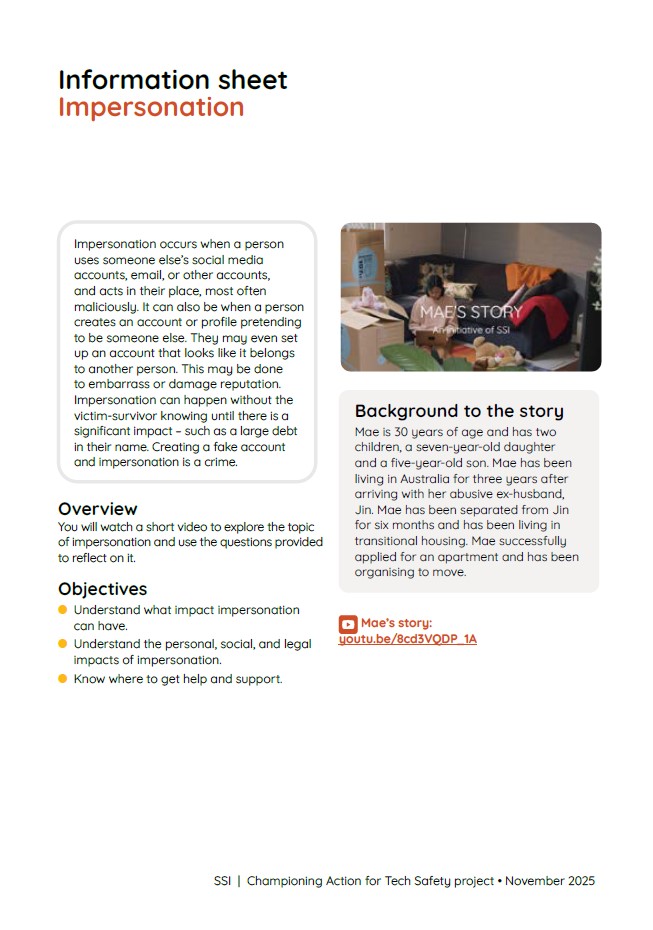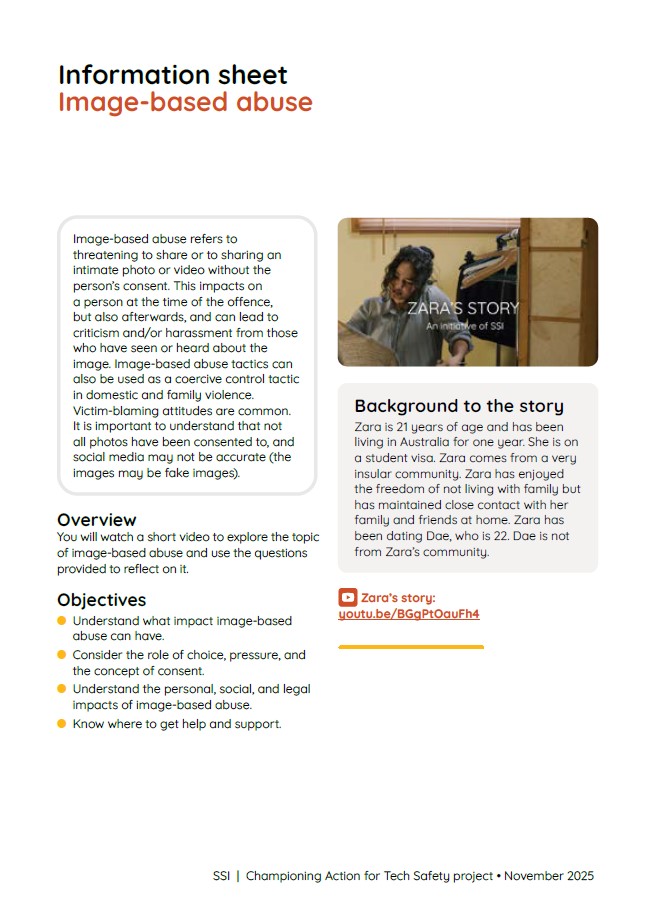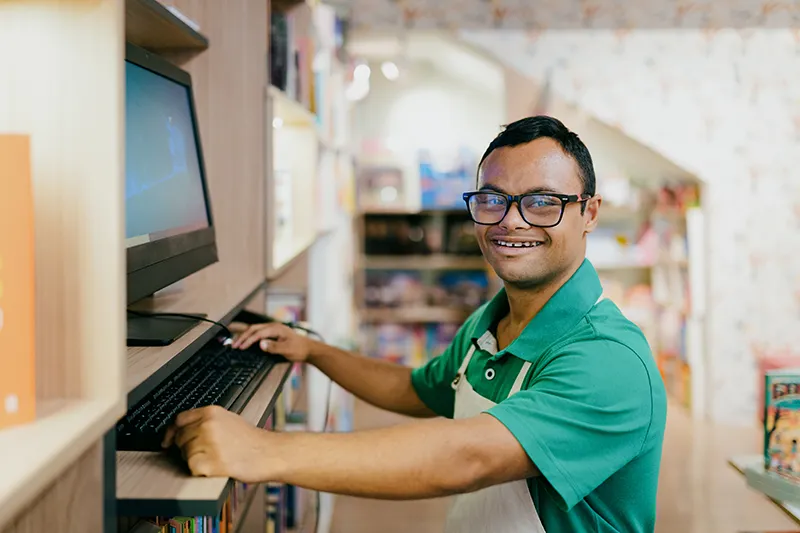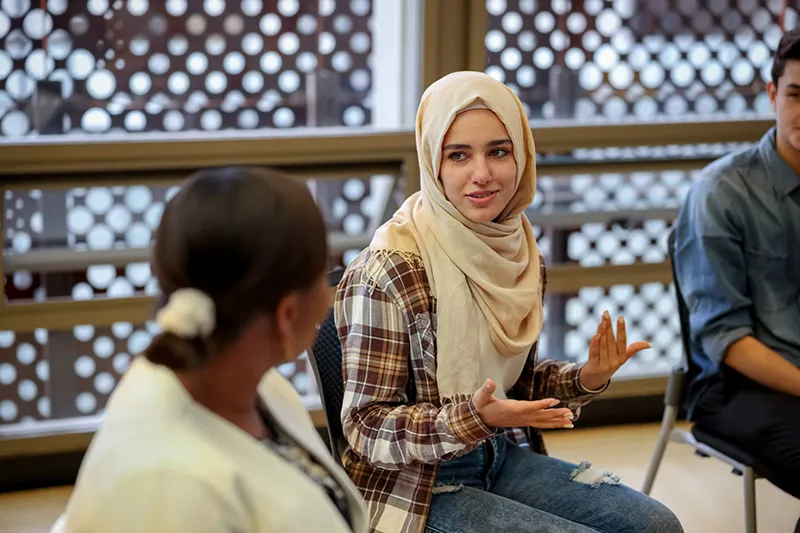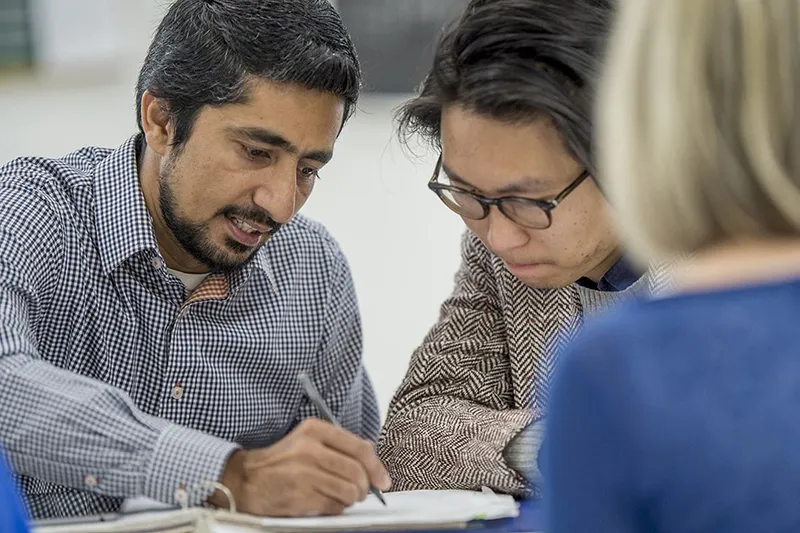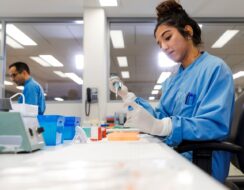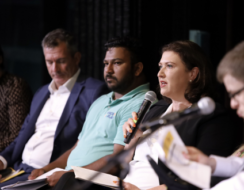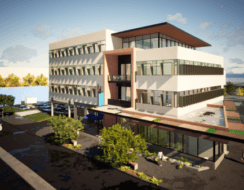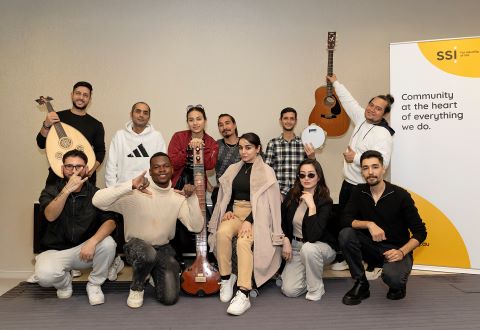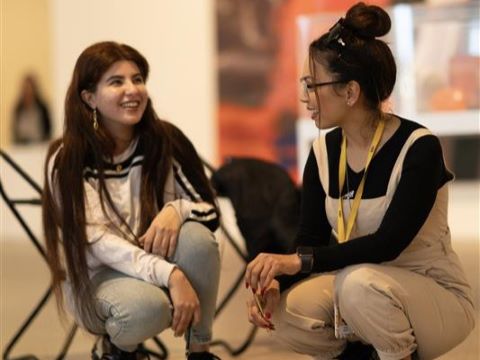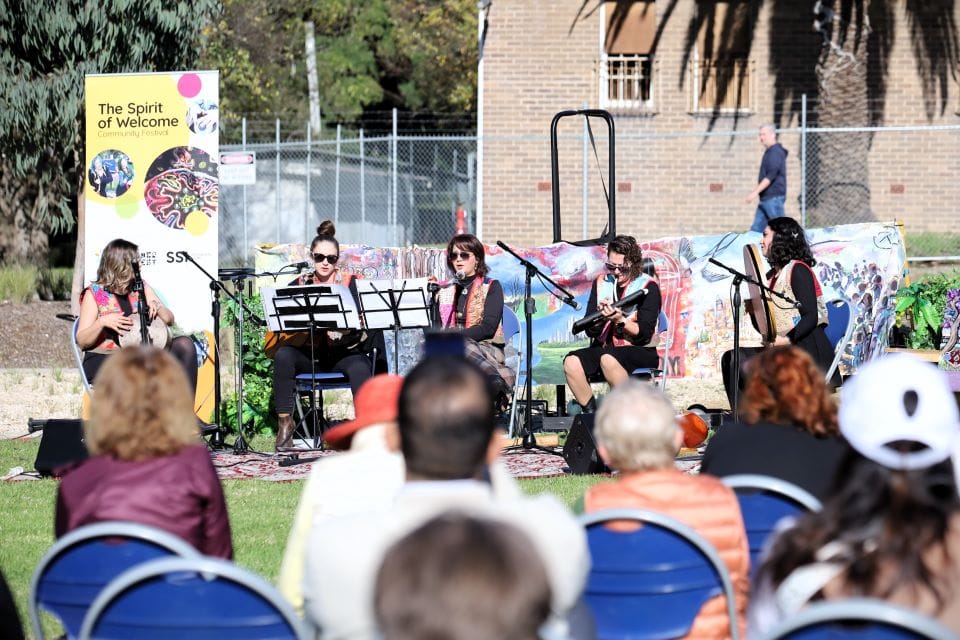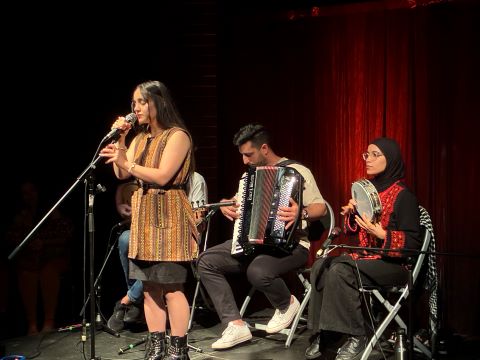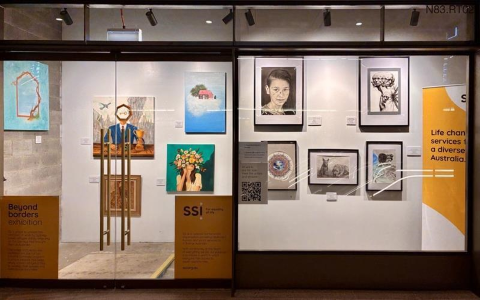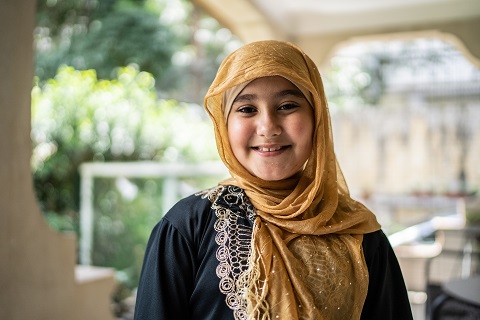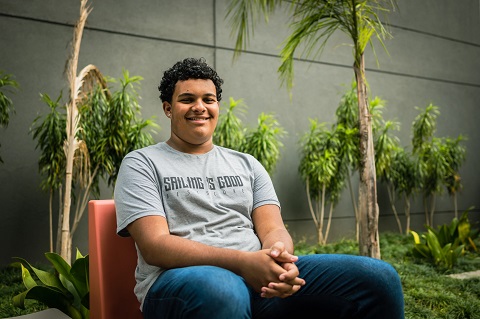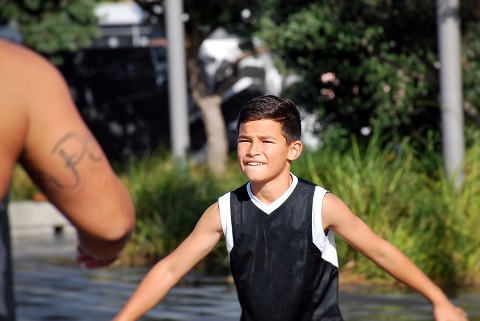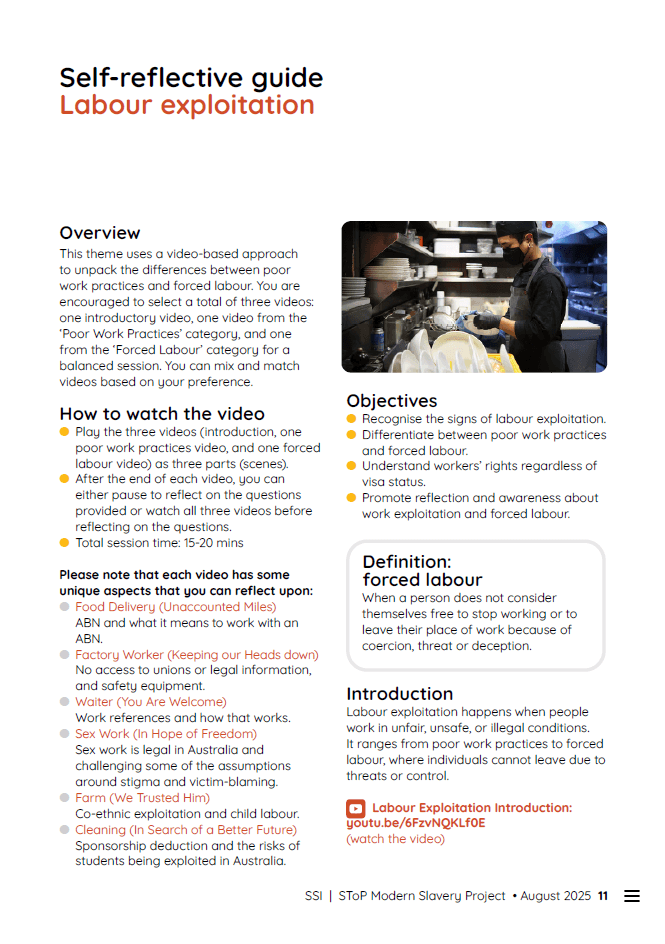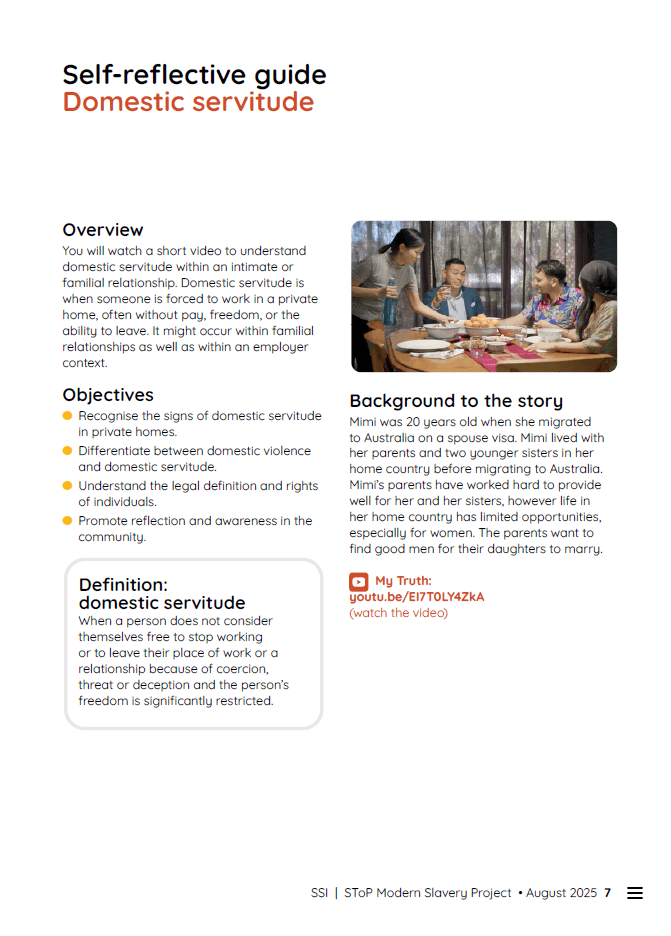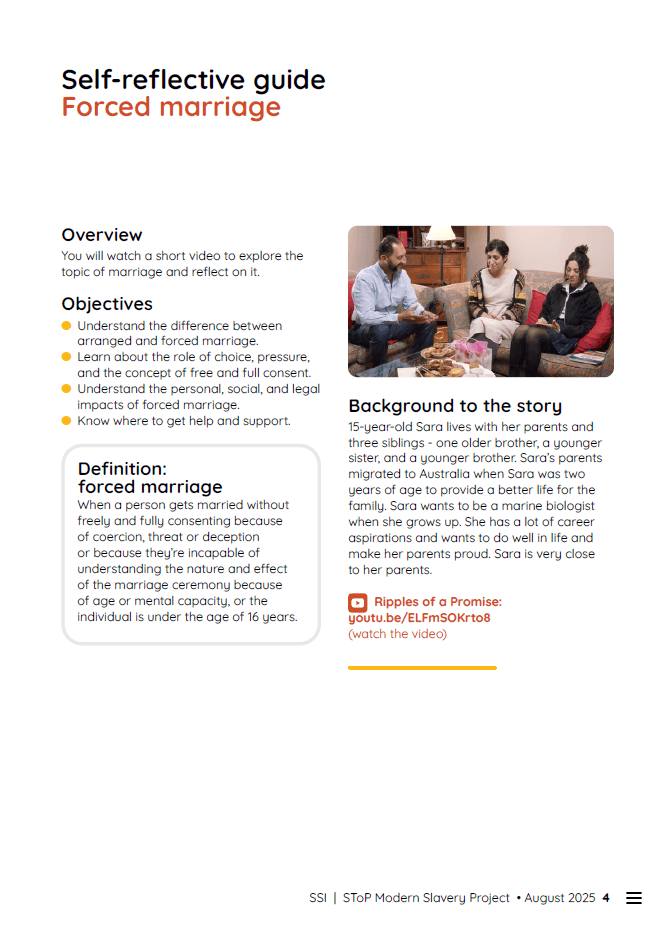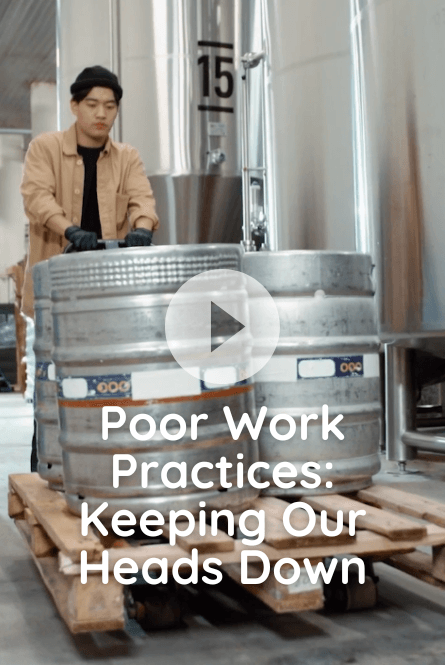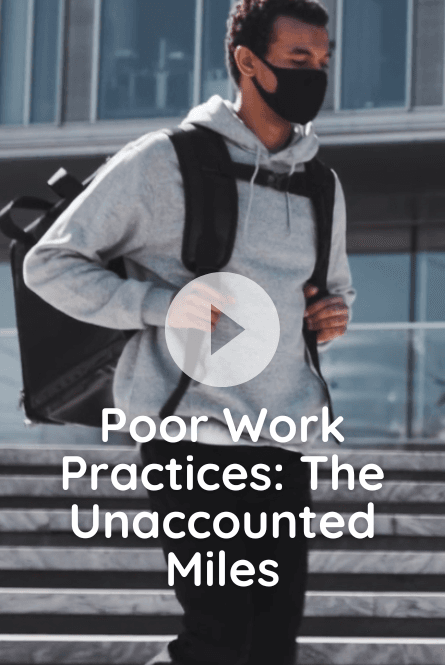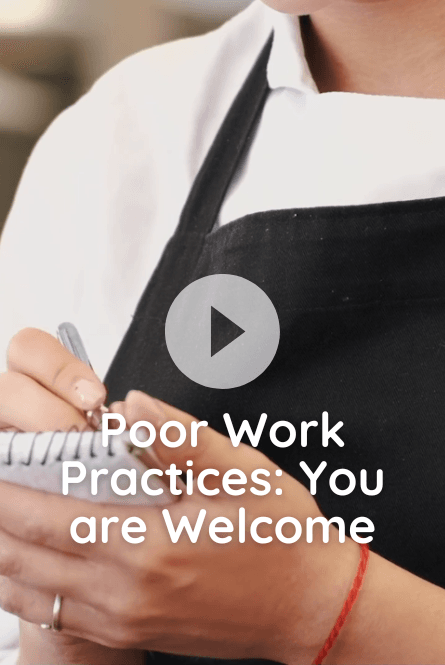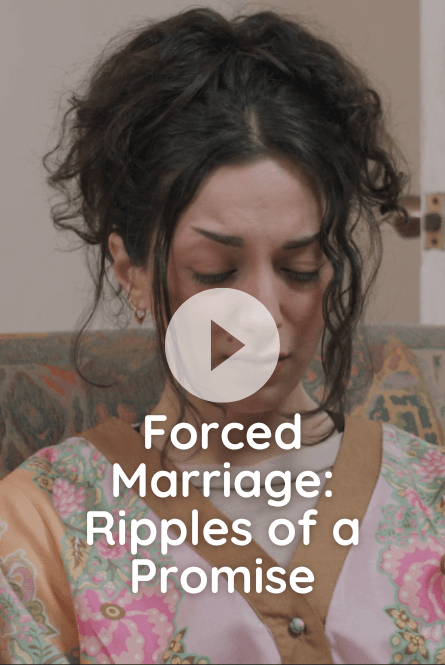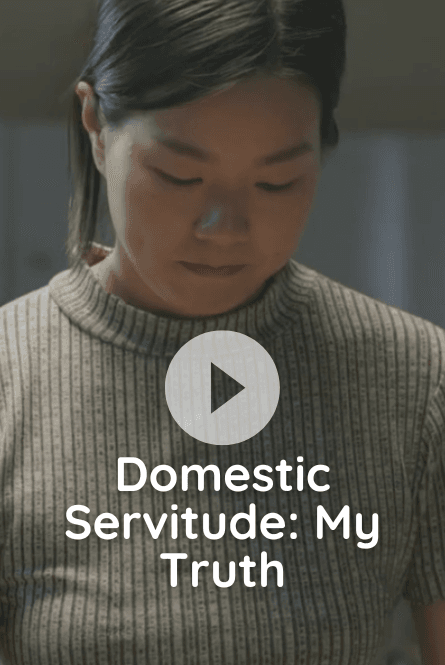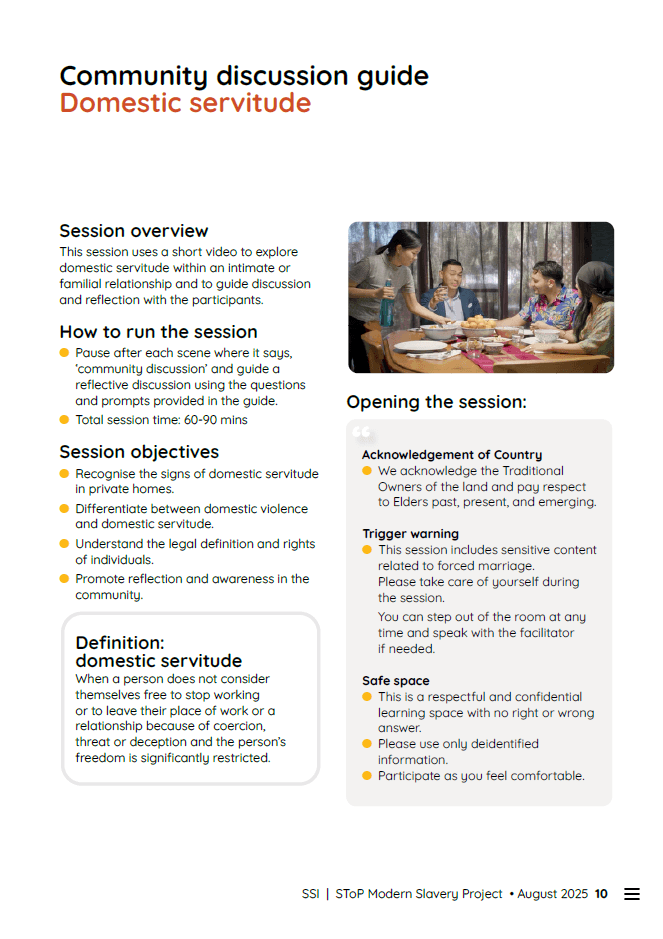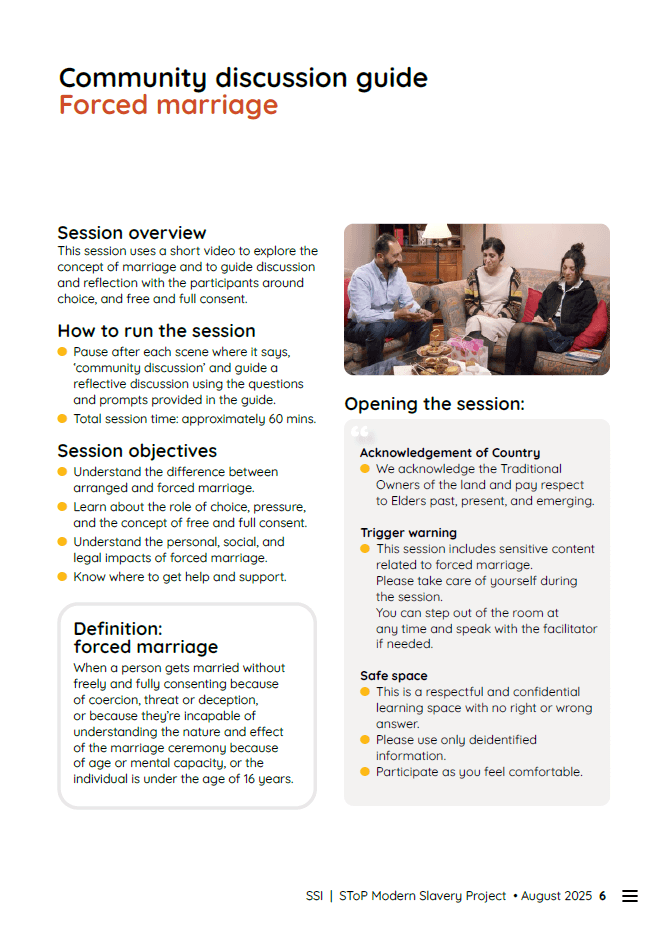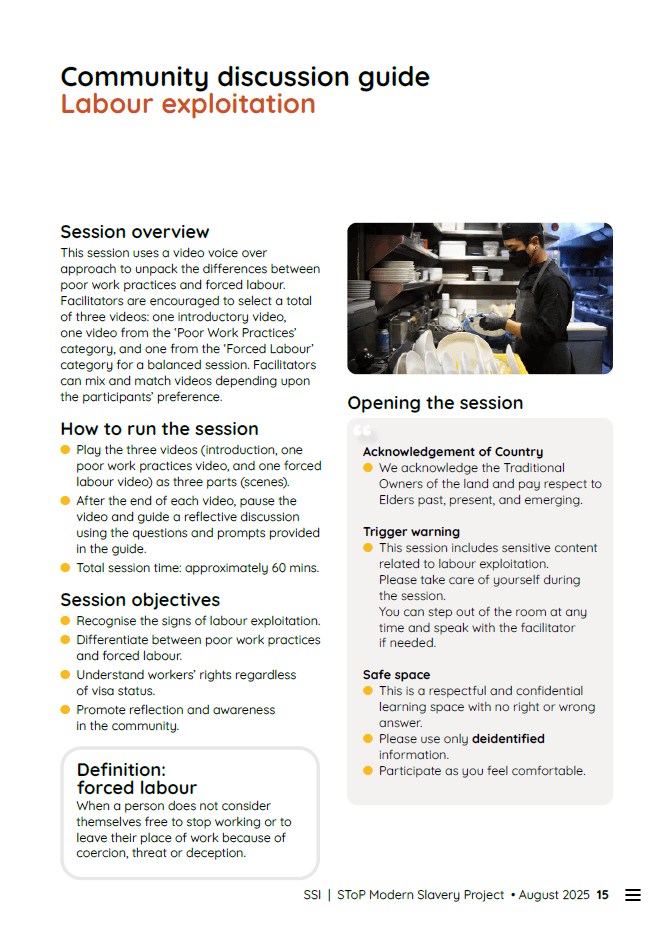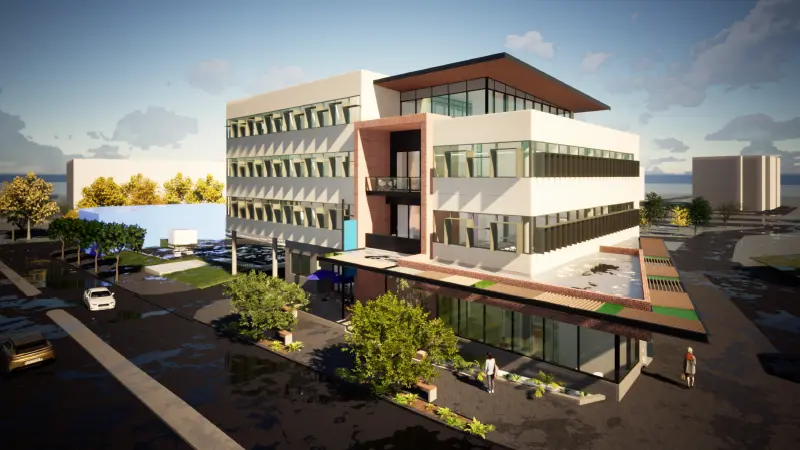Introduction
On this page you will find a guide that is designed to deepen understanding of technology-based abuse in the context of domestic and family violence within refugee and multicultural communities. It has been created for individuals to watch the films independently and engage in thoughtful reflection using the accompanying questions provided under each story.
With each video there is a section with reflective questions and information about support services.
The videos explore the topics of image-based abuse, impersonation, tracking, and the use of children’s devices.
Trigger warning
The videos contain sensitive content related to technology-facilitated domestic and family violence. Please take care of yourself during the session.
Download guide
Download the guide for step-by-step instructions on how to use the videos.
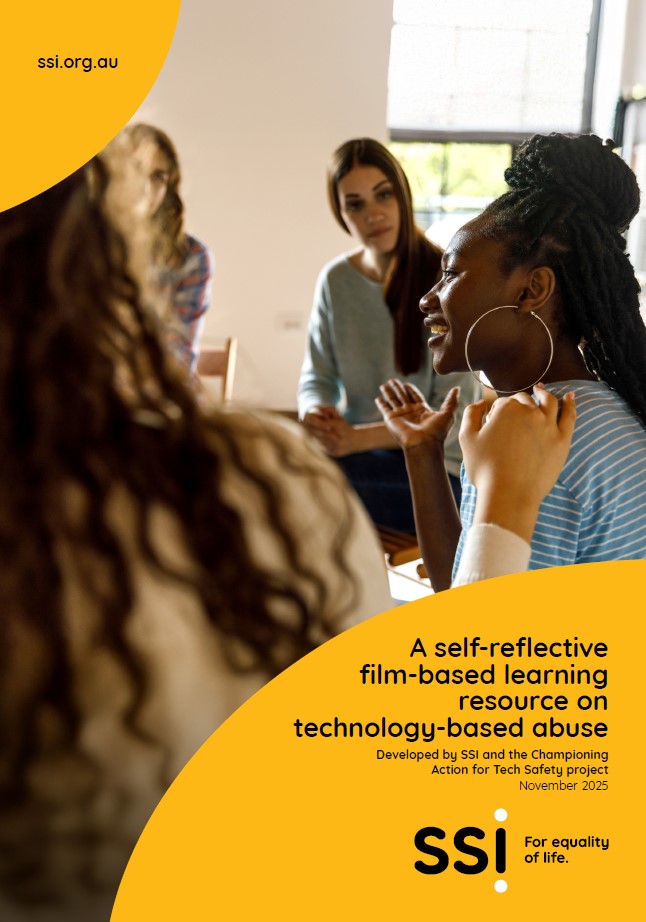
This guide is for individuals to watch the films independently and engage in thoughtful reflection using the accompanying discussion questions provided under each story.
You can also download the individual topic sections to focus on one topic at a time.
Play videos
Explore topics:
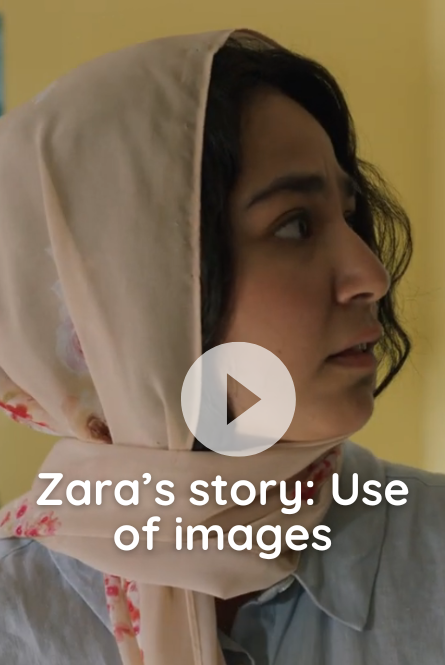
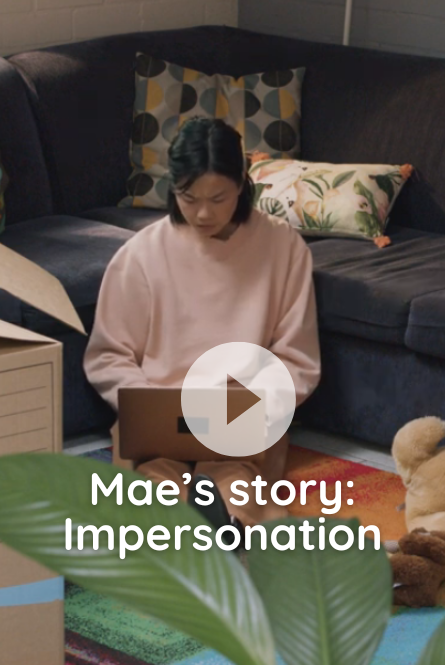
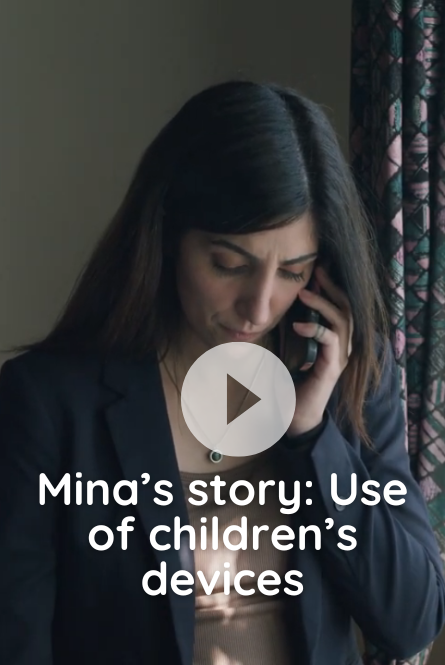
Questions about these resources?
Email: info@ssi.org.au
This project was funded through the eSafety Commissioner’s Preventing Tech-based Abuse of Women Grants Program – an Australian Government initiative.
How to deliver community education sessions on technology-facilitated abuse
On this page you will find a guide for facilitators to deliver community education sessions to groups using videos developed for the Championing Action for Tech Safety project. This guide is designed to deepen the understanding of technology-facilitated abuse in the context of domestic and family violence within refugee and multicultural communities. There are instructions of how to introduce the videos and guidance to foster discussion.
With each video there is a section with reflective questions and information about support services.
The videos explore the topics of image-based abuse, impersonation, tracking, and the use of children’s devices.
Your role as a facilitator
As a facilitator, your role is to:
- Guide discussions to explore and understand these complex and sensitive topics in a safe and respectful manner.
- Ensure a safe and inclusive space for all voices to be heard.
- Provide accurate information and clarify misunderstandings.
- Model empathy and active listening.
- Factor in cultural nuances when discussing these issues with diverse communities.
Responding to disclosures
Due to the sensitive nature of these topics, disclosures may occur. Therefore, as a facilitator, you must:
- Assess for safety risks
- Listen without judgement
- Acknowledge the courage it takes to speak up
- Avoid pressing for details
- Do not make any promises that you cannot fulfill
- Be open about the limitations of your role and explore what support the person is after
- Offer appropriate support and links to services
- Offer to stay back for a conversation
Download guide
Download the guide for step-by-step instructions on how to use the videos.
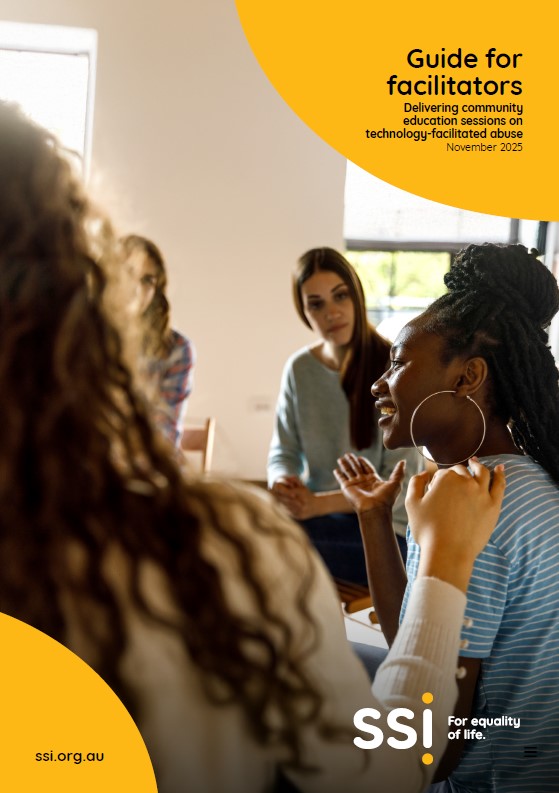
This guide supports the delivery of community education sessions using audio-visual stories to explore image-based abuse, impersonation, tracking, and children’s device use.
Play videos
Explore topics:



Questions about these resources?
Email: info@ssi.org.au
This project was funded through the eSafety Commissioner’s Preventing Tech-based Abuse of Women Grants Program – an Australian Government initiative.
Culturally-responsive employment support for refugees with disability
We provide culturally-responsive employment support for people from refugee backgrounds in NSW, QLD and Victoria living with injury, illness or disability.
With over 25 years of experience offering refugee employment support services and job support for migrants, we help people recognise their skills and build confidence in what they can do.
Who we help
Inclusive Employment Australia has replaced Disability Employment Services.
SSI offers the Inclusive Employment Australia program in NSW, QLD and Victoria. Click here to find our office locations.
To be eligible to receive services with SSI, participants must:
- be an Australian resident or eligible visa holder (protected special category visa, temporary protection visas, or safe haven visas)
- have a disability, injury or health condition
- be between 14 and 67 years of age
- not be studying full-time
- not be working at or above your assessed work capacity.
Participants do not need to receive an Income Support Payment to access support.
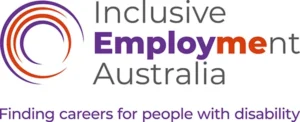
Inclusive Employment Australia is funded by the Australian Government Department of Social Services.
Download information flyer/poster
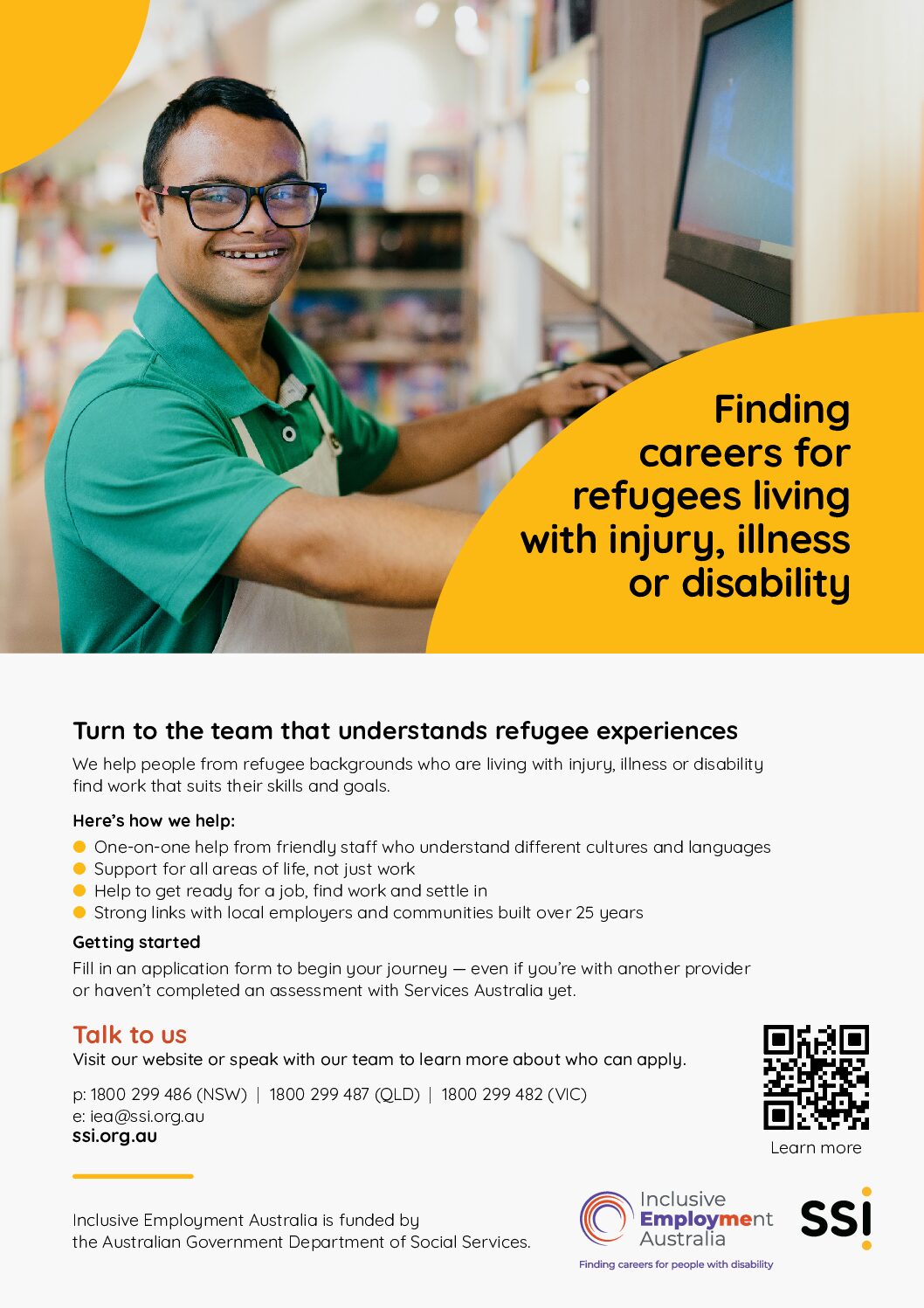
Where can you find us?
NSW
Ashfield
First Tuesday of every month
9am – 4pm
Level 2, 158 Liverpool Rd, Ashfield NSW 2131
1800 299 486
Auburn
Monday – Friday
9am – 5pm
Suite 405, Level 4/39 Queen St, Auburn NSW 2144
1800 299 486
Bankstown
Monday – Friday
9am – 5pm
Level 2, 462 Chapel Rd, Bankstown NSW 2200
1800 299 486
Bonnyrigg
Wednesday
9am – 4pm
2 Wall Pl, Bonnyrigg NSW 2177
1800 299 486
Burwood
Monday and Wednesday
10am – 4pm
2 Conder St, Burwood NSW 2134
1800 299 486
Cabramatta
Monday – Friday
9am – 5pm
Suite 3, Level 1 Dutton Plaza Office, 8 Dutton Ln, Cabramatta NSW 2166
1800 299 486
Campbelltown
Tuesday, Wednesday and Thursday
10am – 4pm
Suite 2 Level 6, 138 Queen St, Campbelltown NSW 2560
1800 299 486
Campsie
Monday and Friday
10am – 4pm
Level 2, 59-63 Evaline St, Campsie NSW 2194
1800 299 486
Fairfield
Monday – Friday
9am – 5pm
7 William St, Fairfield NSW 2165
1800 299 486
Lakemba
Tuesday, Wednesday and Thursday
10am – 4pm
194-198 Lakemba Rd, Lakemba NSW 2195
1800 299 486
Liverpool
Monday – Friday
9am – 5pm
Level 1, 45-47 Scott St, Liverpool NSW 2170
1800 299 486
Marrickville
Tuesday and Thursday
10am – 4pm
176 Marrickville Rd, Marrickville NSW 2204
1800 299 486
Merrylands
Tuesday, Wednesday and Thursday
9am – 4pm
12/254 Pitt St, Merrylands NSW 2160
1800 299 486
Miller
Monday – Friday
9am – 5pm
C02-90 Cartwright Av, Miller NSW 2168
1800 299 486
Parramatta
Tuesday
10am – 4pm
Level 19, 60 Station St East, Parramatta NSW 2150
1800 299 486
Wetherill Park
Tuesday and Thursday
10am – 4pm
Suite 105/447 Victoria St, Wetherill Park NSW 2164
1800 299 486
QLD
Beenleigh
Monday – Friday
9am – 5pm
Level 1, 110-112 George St, Beenleigh QLD 4207
1800 299 487
Chermside
Monday, Tuesday and Wednesday
10am – 4pm
Westfield Shopping Centre, Level 2, Corner Gympie & Hamilton Rd, Chermside QLD 4032
1800 299 487
Goodna
Monday – Friday
9am – 5pm
9 William St, Goodna QLD 4300
1800 299 487
Ipswich
Tuesday and Thursday
9am – 4pm
Level 3, 16 East St, Ipswich QLD 4305
1800 299 487
Kingston
Wednesday
9am – 4pm
558 Kingston Rd, Kingston QLD 4114
1800 299 487
Logan Central
Monday – Friday
9am – 5pm
91 Wembley Rd, Logan Central QLD 4114
1800 299 487
Moorooka
Tuesday
9am – 4pm
1/8 Mayfield Rd, Moorooka QLD 4105
1800 299 487
Sunnybank
Monday – Friday
9am – 5pm
Shop 4, 397 Hellawell Rd, Sunnybank QLD 4109
1800 299 487
Toowoomba
Tuesday, Wednesday and Thursday
10am – 3pm
123 Margaret St, Toowoomba QLD 4350
1800 299 487
Upper Mount Gravatt
Tuesday, Wednesday and Thursday
9am – 4pm
Shop 3B, 2092 Logan Rd, Upper Mount Gravatt QLD 4122
1800 299 487
VIC
Broadmeadows
Tuesday, Wednesday and Thursday
9am – 4pm
Level 2, Building A, 61 Riggall St, Broadmeadows VIC 3047
1800 299 482
Cheltenham
Monday – Friday
9am – 5pm
Level 2, 11 Chesterville Rd, Cheltenham VIC 3192
1800 299 482
Cranbourne
Monday , Wednesday and Friday
9am – 4pm
156 Sladen St, Cranbourne VIC 3977
1800 299 482
Croydon
Tuesday
9:30am – 4pm
5 Civic Square, Croydon VIC 3136
1800 299 482
Epping
Monday, Wednesday and Friday
10am – 4pm
Unit 16, 26-38 Miller St, Epping VIC 3076
1800 299 482
Mill Park
Thursday
9:30am – 4pm
11 Mill Park Dr, Mill Park VIC 3082
1800 299 482
Noble Park
Monday – Friday
9am – 5pm
G07/127 Chandler Rd, Noble Park VIC 3174
1800 299 482
Richmond
Monday, Wednesday and Friday
10am – 4pm
Suite 106, 91-95 Murphy St, Richmond VIC 3121
1800 299 482
Ringwood
Monday, Wednesday and Friday
10am – 4pm
Unit 5, 45-51 Ringwood St, Ringwood VIC 3134
1800 299 482
Sunshine
Monday – Friday
9am – 5pm
2 Devonshire Rd, Sunshine VIC 3020
1800 299 482
Werribee
Monday – Friday
9am – 5pm
Suite 10, Level 1, 75 Watton St, Werribee VIC 3030
1800 299 482
What participants will receive
Support is available to people whether they are thinking about starting work or already have a job and need some help. Support is also available for those who would like to volunteer. They can choose the type of support that suits them from the options below.

Help with job-readiness
- Explore employment goals
- Identify and get help with all types of barriers, not just work-related
- Access training and activities to build your skills
- Attend job preparation workshops and forums
- Access to educational institutions, community organisations and other support (including refugee-specific community linkages)

Help finding a job
- Support finding jobs that align with career ambitions, goals, previous experience, skills and work capacity
- Prepare for interviews and boost confidence
- Access to our network of employers
- Help getting overseas qualifications recognised
- Get the job!

Help in the workplace
- Access to support and training at different stages of employment, including workplace integration, onboarding and on-the-job training
- Address emerging challenges
- Support accessing transport, tools, licensing, and other needs
- Making sure the workplace is comfortable, culturally sensitive and supportive
Why choose SSI?
Finding and keeping a job can be especially hard for newly arrived refugees with disability. Language barriers, health and trauma, digital literacy, transport, and limited support networks often make it difficult to access mainstream services like the NDIS.
At SSI, we understand these challenges — and we know how to help overcome them. Since 2018, we’ve delivered Disability Employment Services (DES) with approaches tailored for refugees, including:
- Bilingual and culturally competent staff who understand refugee journeys
- Strong connections with refugee communities, leaders and services
- Personalised support that respects individual needs and lived experience
- Holistic help that goes beyond just job placement, for example, language, housing, financial aid and physical and mental health supports

Staff

Strong connections

Personalised support

Holistic help
Our track record shows the difference: We assisted over 11,600 participants between 2017 and 2024 into employment, education pathways, obtaining overseas skills and qualification recognition, and referrals into wrap-around and support services.
By focusing on refugee participants, SSI offers a culturally safe employment program, that is trusted and proven — giving people the best chance to succeed in the workforce and build a bright future.
What makes us different
How to get started
To begin the journey with us, please fill in the application form.
You can do this even if the person hasn’t completed an employment assessment with Services Australia yet or if they are with another provider.
Answers to questions you might have
What is the Inclusive Employment Australia (IEA) program?
Inclusive Employment Australia (IEA) is a federal program that helps people with disability, injury or health conditions prepare for work, find suitable employment, and maintain it over time. It offers inclusive employment for people with injury or illness.
Who is eligible for the Inclusive Employment Australia program?
To access IEA services, individuals generally need to meet the general eligibility criteria, unless they qualify under a special eligibility pathway.
General eligibility criteria include:
- Having a current and valid ESAt (Employment Services Assessment) showing a disability, injury or health condition that impacts work capacity.
- Having baseline work capacity (with intervention) under 30 hours per week.
- Being an Australian resident or holding an eligible visa (e.g. Australian citizen, permanent resident, Special Category Visa, Safe Haven Enterprise Visa).
- Being of working age (at least 14 years old and below Age Pension qualifying age).
- Not studying full time (unless special criteria apply).
- Not already working in open employment at or above the assessed employment benchmark.
Special eligibility pathways allow certain groups to access IEA even if they do not fully meet the general criteria. These include Eligible School Leavers, DSP recipients with a prior ESAt, pre-release prisoners, and some NDIS participants under specific conditions.
What is the ESAt / JCA and why is it important?
The ESAt (Employment Services Assessment) or JCA (Job Capacity Assessment) is conducted through Services Australia to assess a person’s work capacity, identify barriers, and determine the most suitable employment service, including Inclusive Employment Australia.
Eligibility for Inclusive Employment Australia generally depends on having a current and valid ESAt.
Can I register directly with an Inclusive Employment Australia provider (not through Services Australia)?
Yes. Some providers allow direct registration, meaning individuals can approach them directly rather than being referred through Services Australia. However, general or special eligibility criteria must still be met.
What kinds of supports and services does Inclusive Employment Australia provide?
Inclusive Employment Australia offers a range of tailored supports, including:
- Preparing for work (skill development, résumé building, interview support)
- Finding work that aligns with individual abilities and goals
- On-the-job support, mentoring and coaching
- Workplace adjustments (assistive technology, flexible hours, modifications)
- Career development and ongoing support as needed
What is the Employment Assistance Fund (EAF)?
The Employment Assistance Fund (EAF) helps pay for workplace adjustments, assistive equipment, modifications, and Auslan interpreting to ensure individuals can work effectively. The fund can be accessed by either the employee or employer.
Can I join Inclusive Employment Australia if I’m not on Centrelink?
Yes. Under the Inclusive Employment Australia design, individuals who are not receiving income support may volunteer into the program, provided they meet the eligibility criteria.
What is SSI’s role in Inclusive Employment Australia?
SSI is a provider for the Inclusive Employment Australia program in selected regions of NSW, QLD and Victoria. We bring specialist experience, particularly in working with people from refugee and migrant backgrounds, to deliver tailored, culturally responsive and community-connected employment services, and trauma-informed job support.
What documentation or proof do I need to show to be eligible for Inclusive Employment Australia?
When registering or commencing with an Inclusive Employment Australia provider, you must provide evidence such as identity documents (e.g. driver’s licence or passport), medical or functional reports, ESAt results, or proof of special eligibility (where applicable).
How long can I receive support under Inclusive Employment Australia?
Support is not limited by a fixed time period. Participants can continue receiving services as long as necessary to achieve their employment goals, subject to ongoing eligibility and program rules.
What happens if my circumstances change while I am with the Inclusive Employment Australia program (e.g. work capacity improves or employment begins)?
If circumstances change, the provider will review your needs and adjust the level or phase of support accordingly. Once commenced, participants generally do not need to requalify eligibility on an ongoing basis.
Who can be contacted for more detailed eligibility advice or to check qualification for the Inclusive Employment Australia program?
For detailed eligibility advice, you can contact Services Australia, your local IEA provider (such as SSI in your area), or review the official IEA guidelines on the Department of Social Services website.
Get help like
Jana
who struggled to find work that fit her needs until she received personalised support and encouragement from SSI. She has now secured her ideal job in the care industry.
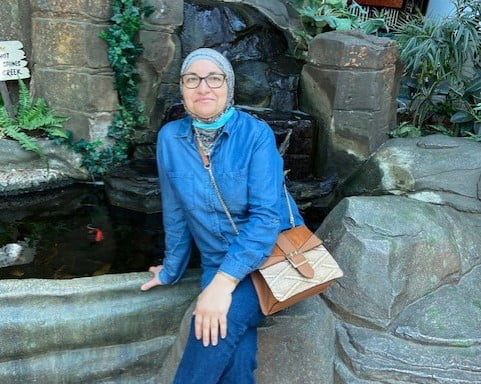
Omar
who wanted to work in retail and study but faced challenges due to living with schizophrenia and an intellectual disability. We helped him with training and securing a job at a supermarket, where he has thrived and achieved his goal of becoming a store manager.
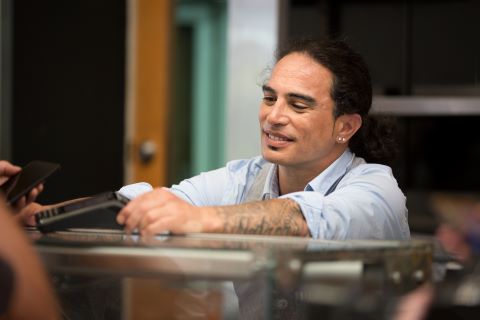
Sara
who struggled to find fulfilling work due to her bipolar affective disorder and unfamiliarity with the Australian workforce. SSI recognised her skills and helped her find a job where she uses her lived experience to assist others find work.
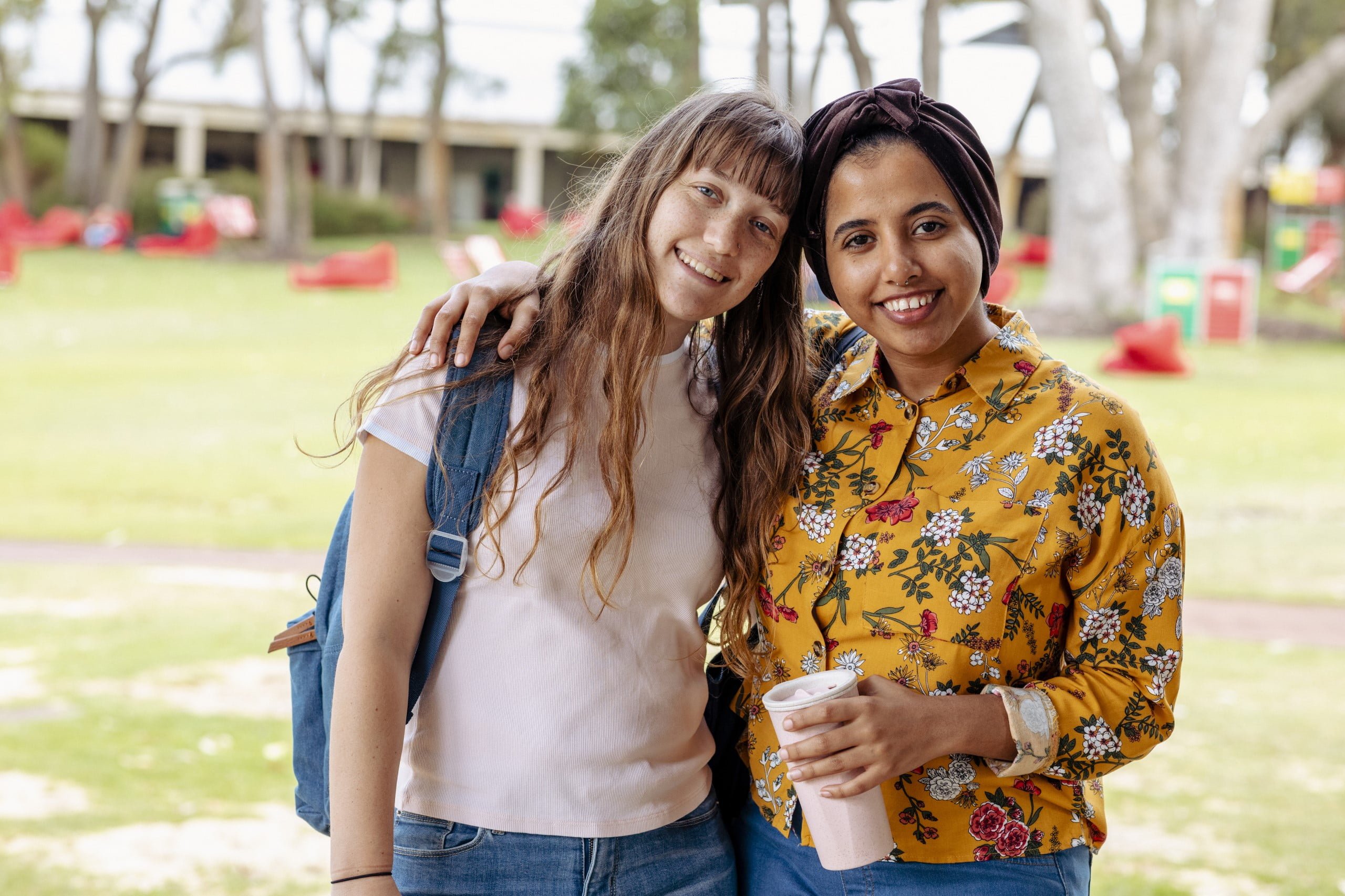
Start the journey now
Fields with an * are required.
Get in touch
SSI offers the Inclusive Employment Australia program in NSW, Queensland and Victoria.
P: 1800 299 486 (NSW)
P: 1800 299 487 (QLD)
P: 1800 299 482 (VIC)
Inclusive hiring support
SSI helps employers across NSW, Queensland and Victoria access skilled refugees with disability through Inclusive Employment Australia, connecting inclusive workplaces with ready talent.
Embrace workplace diversity, all the while achieving your diversity, ESG, or social procurement goals.
We have extensive experience with inclusive hiring for businesses, collaborating with employers to prepare jobseekers for employment. We can help you find candidates, enhance their skills, and help them to overcome the barriers challenging them.
Since 2015, SSI has supported candidates across a diverse range of cultural and linguistic backgrounds, abilities, and life stages, to find sustainable employment matched to their skills and qualifications.
Benefits of hiring refugees with disability
- Access to untapped talent – bring valuable skills, resilience, and motivation into your workforce.
- Boost workplace diversity – create a team that reflects and connects with Australia’s diverse communities.
- Strengthen inclusion – demonstrate your commitment to equity and social responsibility.
- Improve staff retention – many employers find strong loyalty and dedication from employees with lived refugee and disability experiences.
- Fill skills gaps – match roles with capable candidates who are ready to contribute.
- Enhance workplace culture – diverse perspectives drive innovation, empathy, and problem-solving.
- Community impact – play a role in reducing barriers to employment and building stronger, more inclusive communities.
- Access support and incentives – receive ongoing assistance, training, and potential financial subsidies to make the process easier.

Download information flyer/poster
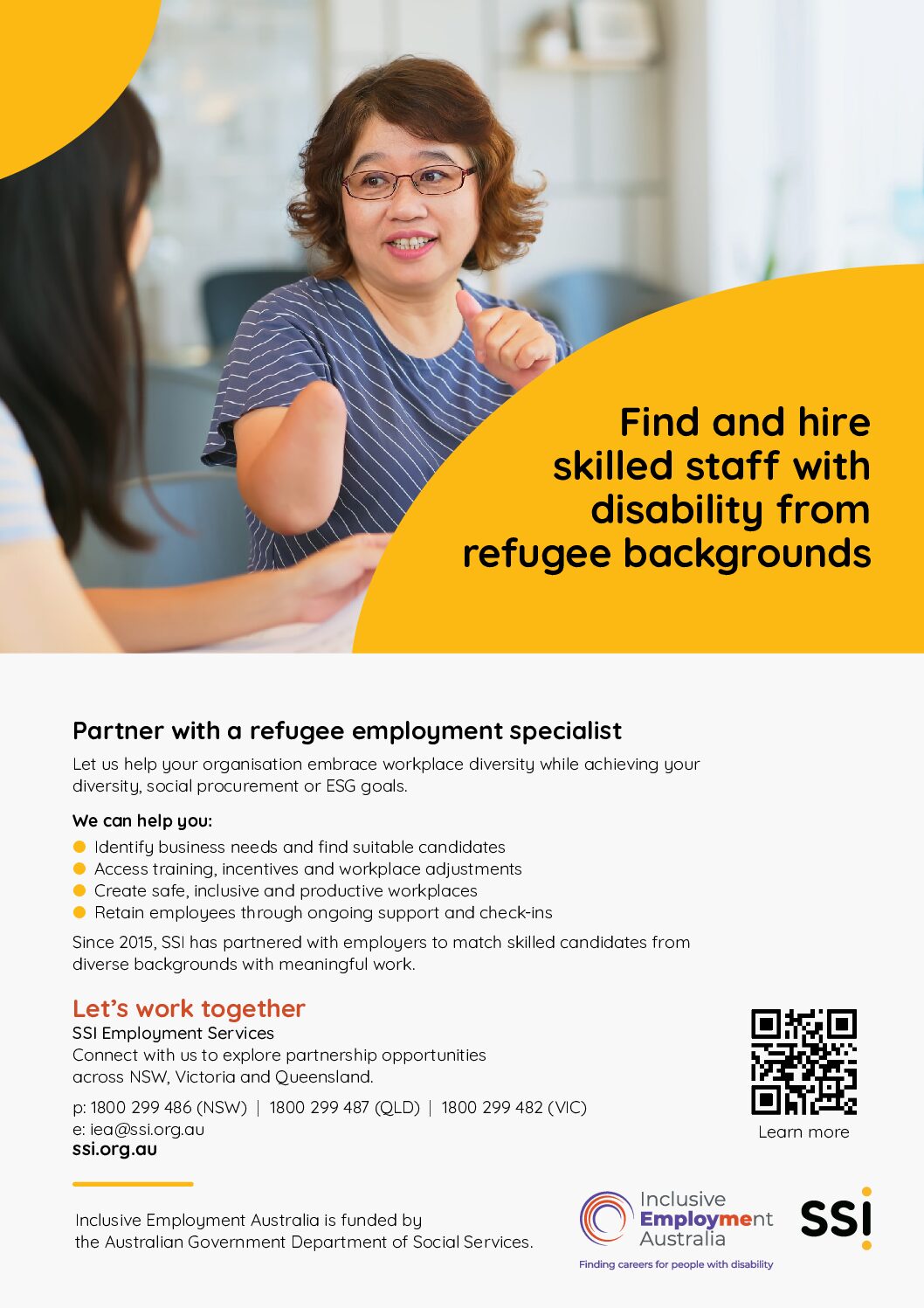
Employer support pathway
We will work together to find the perfect fit for your requirements. You will be able to access expert guidance from providers on recruitment and workplace practices.
We will work with you to:
- identify your business needs
- find suitable candidates
- access training
- make workplace adjustments, job customisation and tailoring
- provide safe and productive workplaces
- retain employees with disability.
What we offer
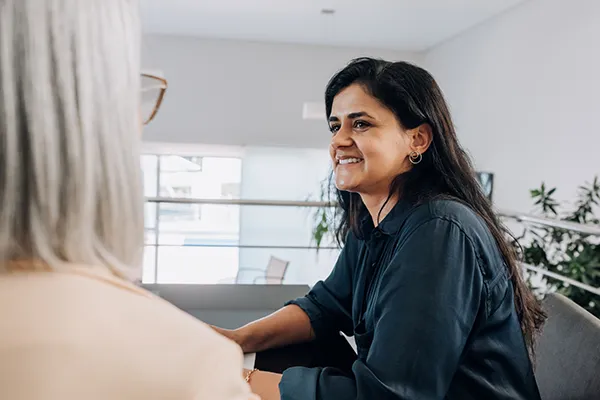
- Understand your needs – we work with you to assess your business needs and plan next steps.
- Tailored job matching – roles are customised to align participant abilities with employer requirements.
- Subsidy guidance – support with government subsidies and financial incentives.
- Practical support – funding for participant training, tools, uniforms and travel.
- Networking opportunities – invitations to job fairs and employer events.
- Post-placement support – regular check-ins and site visits to ensure success for both employer and employee.
- Workplace safety – risk assessments and management of any participant-related workplace risks.
- Continuous improvement – employer feedback and reviews help us strengthen our services.
- Diversity training – access to SSI’s interactive workshops and customised training to build inclusive workplaces.
Where we work
We’d love to partner with employers in NSW, Queensland and Victoria close to where our participants live. Take a look at our locations here. With over 37 sites across metropolitan areas, there are lots of ways we can connect.
Start hiring inclusively today
SSI offers this service in NSW, Queensland and Victoria.
P: 1800 299 486 (NSW)
P: 1800 299 487 (QLD)
P: 1800 299 482 (VIC)

Inclusive Employment Australia is funded by the Australian Government Department of Social Services.
About Creative Compass
For refugee artists, creative practice is more than a profession — it’s a lifeline, bridging past experiences with new possibilities.
Recognising art as a pathway to healing, cultural expression, and economic participation, SSI’s Humanitarian Settlement Program developed Creative Compass to invest in newcomer’s potential, offering tailored mentorship, skills development, and pathways into Australia’s arts industry.
With Creative Compass, refugee artists navigate new horizons, shaping their dreams while enriching Australia’s collective story.



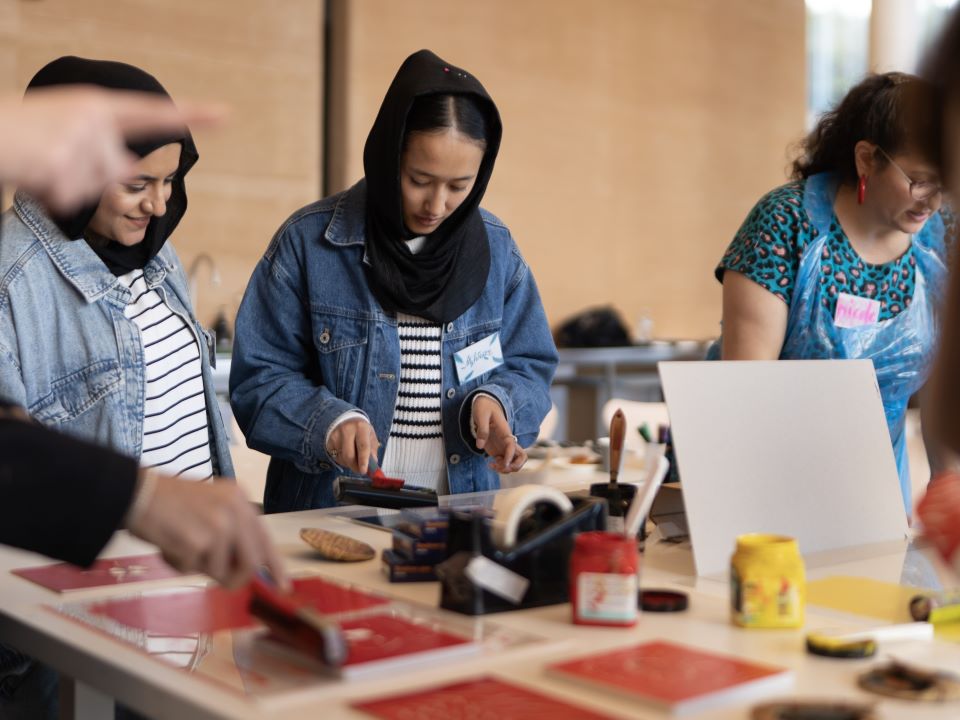
Why Creative Compass?
Newly arrived refugee artists bring extraordinary skills, stories, and cultural traditions, yet too often face barriers to opportunity.
Through tailored mentorship, workshops, and connection to professional networks, the program helps artists:
- Build sustainable creative careers
- Foster social inclusion through exhibitions, performances, and community events
- Enhance wellbeing through creative expression and supportive spaces
- Access resources, studios, and professional networks
- Celebrate cultural identity across visual arts, music, performance, and storytelling
Art speaks across cultures and languages — it heals, inspires, and helps people feel at home in Australia.
Our impact
124
newly arrived artists
engaged in the program.
40,000
dollars in artist’s earnings
through sales, performances, and commissions.
90
percent of participants
reported a stronger sense of belonging and inclusion within the community.
FY24 and FY25

Behind the scenes of Creative Compass
What we do

Identifying Talent: Finding and nurturing creative clients within HSP

Artist Consultations: Providing orientation and tailored guidance on navigating the Australian arts industry

Workshops & Masterclasses: Building professional skills — from writing artist bios to setting up an art business

Education & Training Pathways: Connecting artists to formal learning and qualifications

Excursions: Facilitating creative experiences and immersions to deepen skills and connection

Exhibitions and showcases: Hosting exhibitions and events for artists, and connecting them with paid opportunities

Music Initiatives & Performances: Creating collaborative spaces for musicians and performers

Mentorship & Networking: Connecting artists with peers, mentors, and industry professionals
What’s on
Partnerships and collaboration
Collaboration is central Creative Compass. The program thrives through partnerships with organisations, businesses, and cultural institutions that share a commitment to inclusion and creative expression.
These collaborations make it possible to deliver workshops, exhibitions, and mentorship opportunities that open doors for refugee artists to connect with Australia’s arts industry. From co-curated events and professional development programs to in-kind support such as studio spaces and materials, partnerships and collaborations create meaningful pathways for refugee artists to connect, grow, and thrive within Australia’s arts industry.
So far, we have partnered or collaborated with:
- Cultural Arts Collective
- Macquarie Bank
- Diversity Arts Australia
- Sydney Opera House
- Community Refugee Welcome Centre
- CuriousWorks
- Art Gallery of NSW
- The University of Sydney
- 1 Elizabeth
Recent highlights
Future directions
Since forming in 2023, Creative Compass started as a small project and has grown into a pioneering, comprehensive program supporting artists to rebuild their creative lives and share their talents with Australian audiences. This is just the beginning. Future directions include:
- Promote Creative Compass artists to showcase and perform nationally
- Developing programs for refugee children and youth
- Establishing a dedicated art hub for rehearsals, exhibitions, and events
- Extending regional outreach and conducting long-term research into wellbeing and career outcomes
- Building a replicable model for culturally responsive arts programs
Get involved
Creative Compass is a growing movement of artists, mentors, and supporters.
If you’d like more information, if you’re a cultural institution wanting to collaborate, or a stakeholder interested in partnership opportunities — we’d love to hear from you.
Email: creativecompass@ssi.org.au
Ghasan Saaid
You could make a world of difference in a child’s life as a kinship or foster carer
When children cannot live with their parents, they need care that is safe, supportive, and connected to their family and culture.
Wherever possible, children are placed with family (kin).
When that’s not possible, we look to community members who can provide a culturally appropriate home.
Our approach
Children thrive when they are supported to learn about and maintain their culture, language and religion. This helps them:
What is kinship care?
Kinship carers are approved to provide care in their own homes for a child or young person they are related to, or who knows them as part of their extended family or community. A kinship carer may be:
- A grandparent
- An aunt or uncle
- Another relative
- A close family friend
- For children from culturally and linguistically diverse (CALD) communities, kinship care may also include someone who is known to the child and shares the child’s community, culture, or language group.
SSI’s Multicultural Family Based Care Program works with and supports kinship and foster carers in Brisbane, Logan and Ipswich.
What is foster care?
- Foster carers are approved to provide care in their own home for children and young people who are not related to them biologically.
- This care can be short-term or long-term and is supported by a service provider – in this case, SSI.
Why become a kinship or foster carer?
Becoming a carer is a meaningful way to make a lasting difference in a child or young person’s life. As a kinship or foster carer, you’ll be supported every step of the way with:
- A chance to change a life – Provide safety, stability, and connection for a vulnerable child or young person.
- Ongoing support and training – Access tailored training programs and in-home assistance to help you feel confident in your role.
- Services for children in your care – Children can benefit from early intervention programs delivered through local community hubs.
- Specialist cultural guidance – Receive support from an organisation with expertise in CALD communities, ensuring culturally safe and sensitive care for both you and the children you support.
What we do
At SSI we believe every child deserves safety, belonging, and the chance to stay connected to their family, culture, and community.
The Multicultural Family Based Care Program supports children and young people who cannot live at home by:

Providing safe, culturally responsive kinship and foster care

Recruiting, training, and supporting carers from diverse cultural backgrounds
Working with families to keep children connected to their identity, language, and community
When children need to be in out of home care for their safety and wellbeing, the best outcome for them is to be placed with family wherever possible. If this isn’t possible, we help connect them with carers from their cultural community.
We also support families through a process called family mapping, which helps identify relatives or culturally appropriate carers who can provide children with stability while maintaining their important connections.
By strengthening family and community ties, this program helps children and young people grow up with love, stability, and a strong sense of identity.
Get in touch
If you’re interested in becoming a kinship or foster carer, or simply want to learn more:
Call us on 0466 252 298
Email us at mfbc.logan@ssi.org.au
Self-reflective learning guide
This guide is designed for individuals who want to deepen their understanding of forced marriage, domestic servitude and labour exploitation through personal reflection. With each video there is a section with reflective questions, law, and information about support services.
Download guide
Download the guide for step-by-step instructions on how to use the videos.

This guide is for individuals to watch the films independently and engage in thoughtful reflection using the accompanying discussion questions provided under each story.
You can also download the individual topic sections to focus on one topic at a time.
Play videos
Explore topics:
What does labour exploitation look like?
Showing 1 – of 1 program resources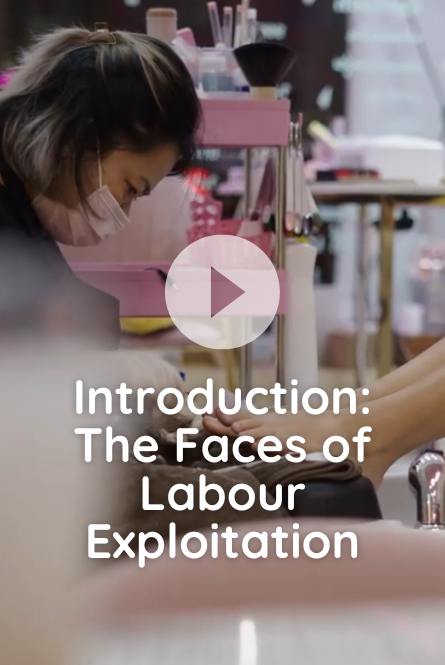
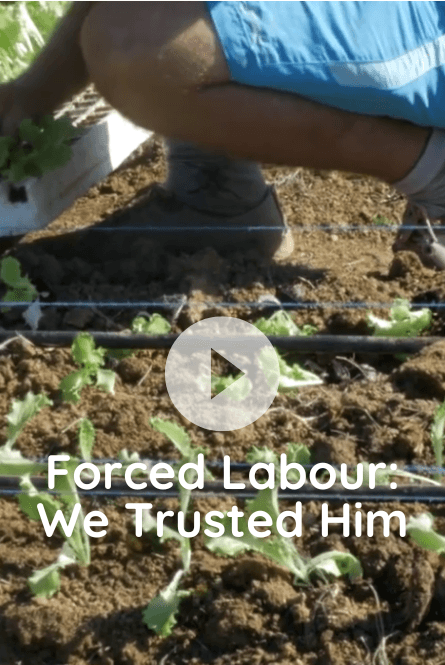
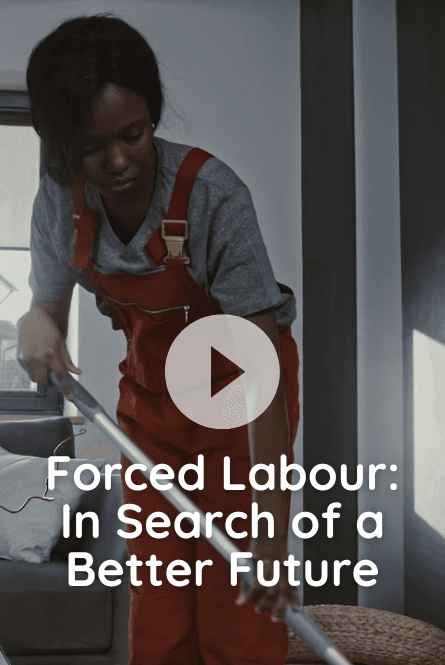
What does forced marriage look like?
Showing 1 – of 1 program resourcesWhat does domestic servitude look like?
Showing 1 – of 1 program resourcesQuestions about these resources?
Facilitator guide for leading group sessions in community settings
There are three story-based videos that have been developed to raise awareness and break down complex information on forced marriage, domestic servitude, and forced labour into simple relatable information. These story-based videos present these issues in a way that allows for ‘othering’, yet foster a sense of empowerment through awareness, education, and meaningful engagement aimed at challenging and disrupting harmful norms and practices.
Each video has natural community discussion points where the facilitator pauses to hold a discussion and reflection with the participants.
Each video comes with a complete guide of questions to support discussion after each scene.
Download guide
Download the guide for step-by-step instructions on how to use the videos.
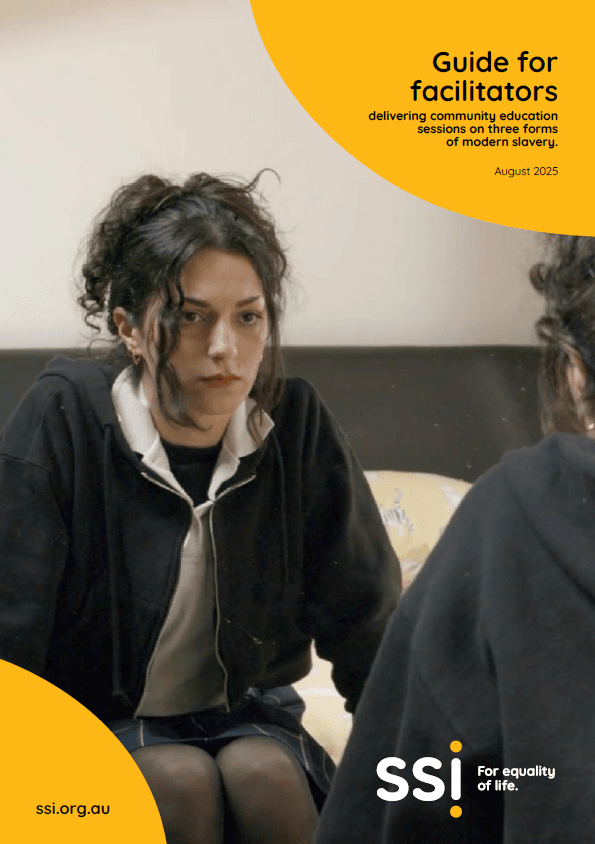
This guide provides guidance in delivering community education sessions through audio-visual stories that explore three forms of modern slavery.
You can also download the individual topic sections to focus on one topic at a time.
Play videos
Explore topics:
What does labour exploitation look like?
Showing 1 – of 1 program resources


What does forced marriage look like?
Showing 1 – of 1 program resourcesWhat does domestic servitude look like?
Showing 1 – of 1 program resourcesQuestions about these resources?
Building a bright future for the Logan community
Planned for completion in mid-2026, the Logan Hub is a purpose-built facility jointly funded by SSI and the Queensland Government to create new economic opportunities for Logan City residents.
The Hub aims to revolutionise the landscape of community infrastructure by establishing a central place that connects people with services, opportunities and support, leading to positive economic contributions and change in the Logan community.
Snapshot: New Hub to uplift Logan's economic potential
- A new, first of its kind ‘Economic Hub’ to be built in the heart of Logan Central, Queensland.
- $15 million, 2600sqm community infrastructure, over four levels.
- All-in-one facility for job seekers and employers to access better opportunities, and tap into a skilled workforce, increasing overall economic participation.
- Construction completed by mid-2026.
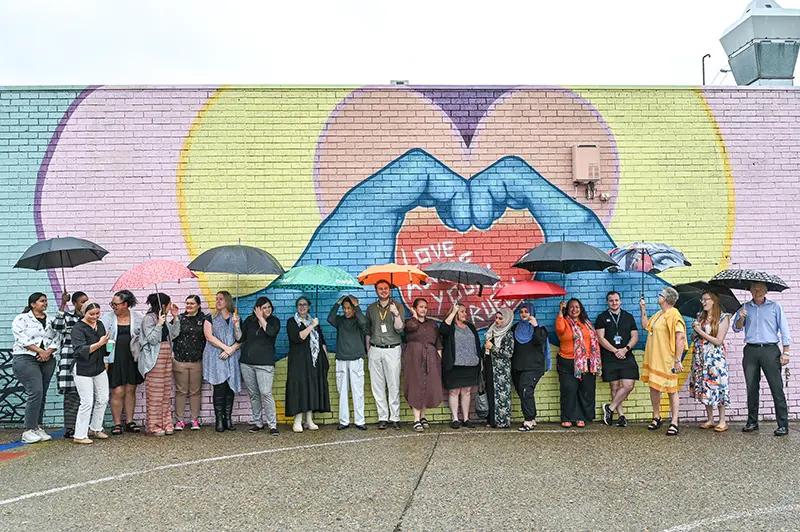
Community at the heart
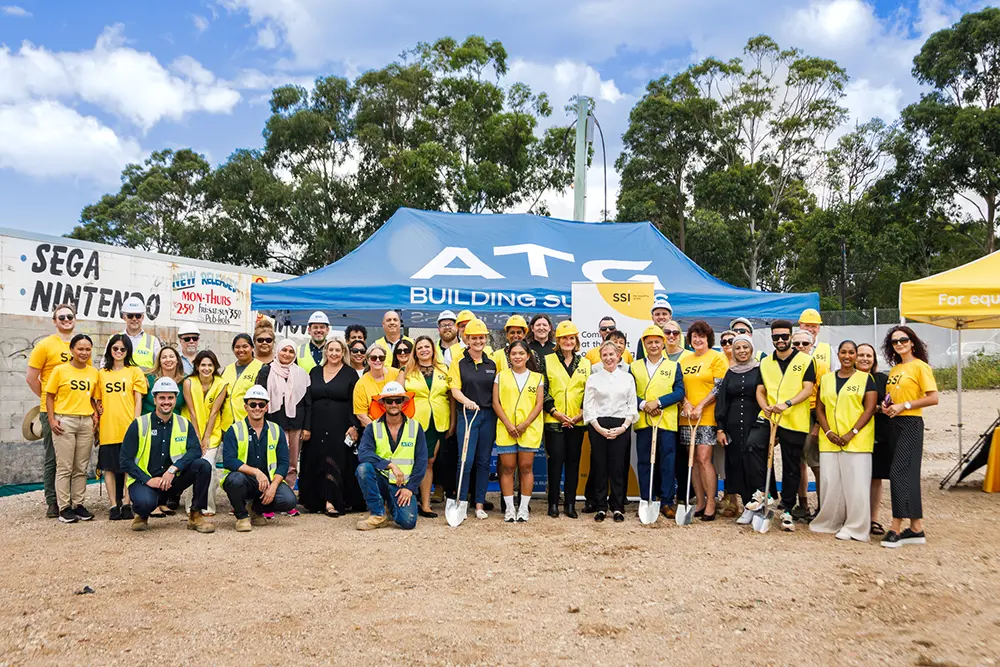
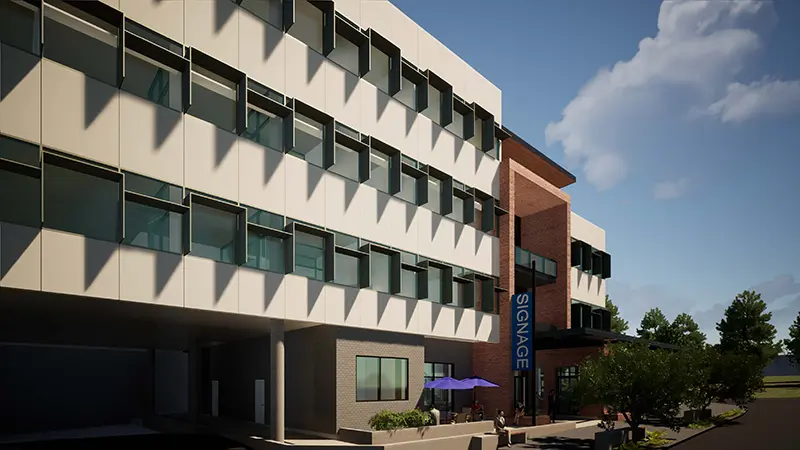
Logan’s new hub will include
- Employment and training programs
- Training and interview rooms
- Co-working spaces
- Bookable community meeting rooms
- Break-out spaces
- Study centre
- Business incubator space or social enterprise shopfront
- Community-based function centre, and
- Café and retail opportunities
Naming the Hub
The name of the Hub will be chosen by the community it serves. Advisory group members will speak with their communities to gather ideas, and all suggestions will be carefully reviewed. Together, we’ll create a shortlist and share the final choice with the community. This way, the Hub’s name will reflect Logan’s spirit, identity and shared vision for the future.
Pathway to the Logan Hub
Frequently asked questions
The Logan Hub will be a new community and economic space where people can access jobs, training, education, business opportunities and community support, all in one welcoming location.
The Hub is being developed by (SSI) in partnership with the Queensland Government, working closely with local organisations and the Logan community.
The Hub is planned to open in mid-2026. Updates on construction and milestones will be shared on this page.
The Hub will feature co-working and training spaces, interview and meeting rooms, a study centre, social enterprise and retail opportunities, a childcare facility for those using Hub services, community function areas and a café.
The Hub will be open to everyone in the Logan community including families, job seekers, young people, small businesses, and multicultural communities.
Yes. Expressions of Interest are open for organisations interested in collaborating, running programs or offering services within the Hub. You can learn more about collaboration opportunities and submit and expression of interest here.
The Hub will provide training, employment and small business support programs – helping people build skills, connect with employers and access new opportunities.
Yes. The Hub will include bookable meeting and function spaces for community groups, workshops and events.
The latest updates on the Hub will be posted on this page. For any other enquiries or questions you can get in touch at loganhub@ssi.org.au
Contact us
For any enquiries or questions please get in touch with us at loganhub@ssi.org.au.
The development of the Logan Hub was developed with the support of the Queensland Government’s Community Infrastructure Investment Partnership (CIIP) program in association with SSI.
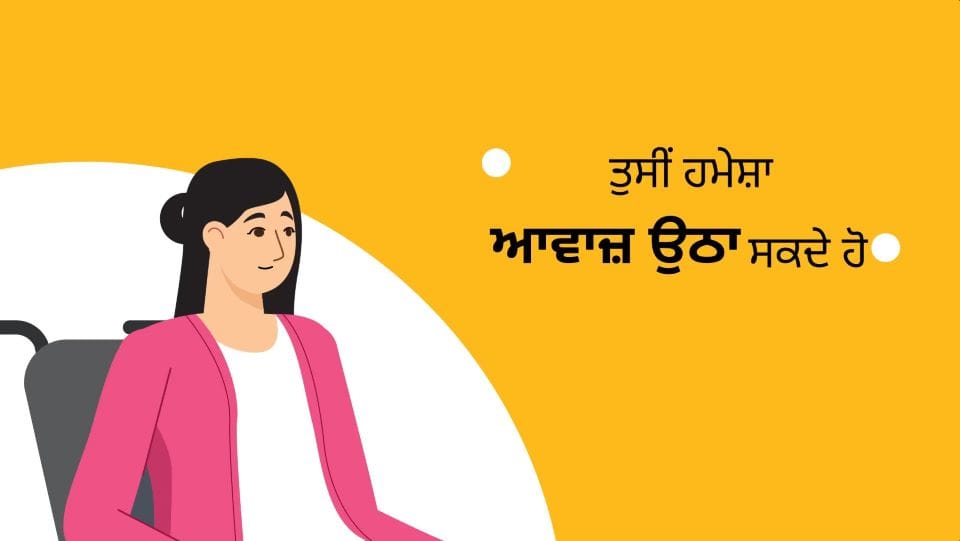
ਇੱਕ NDIS ਭਾਗੀਦਾਰ ਵਜੋਂ ਆਪਣੇ ਅਧਿਕਾਰਾਂ ਬਾਰੇ ਜਾਣੋ
ਇਸ ਐਨੀਮੇਟਡ ਵੀਡੀਓ ਵਿੱਚ, ਜਾਣੋ ਕਿ NDIS ਭਾਗੀਦਾਰ ਆਪਣੀਆਂ ਸਹਾਇਤਾਵਾਂ ਜਾਂ ਸੇਵਾਵਾਂ ਬਾਰੇ ਕਿਵੇਂ ਫੀਡਬੈਕ ਦੇ ਸਕਦੇ ਹਨ। ਸਾਰਾ ਦੀ ਕਹਾਣੀ ਨੂੰ ਇੱਕ ਉਦਾਹਰਨ ਵਜੋਂ ਵਰਤਦੇ ਹੋਏ, ਅਸੀਂ ਤੁਹਾਨੂੰ ਕਦਮ ਡਰ ਕਦਮ ਇਹ ਦੱਸਾਂਗੇ ਕਿ ਆਪਣੇ ਸੇਵਾ ਪ੍ਰਦਾਤਾ ਨਾਲ ਚਿੰਤਾਵਾਂ ਕਿਵੇਂ ਉਠਾਉਣੀਆਂ ਹਨ, ਵਕਾਲਤ ਸਹਾਇਤਾ ਕਿਵੇਂ ਲੱਭਣੀ ਹੈ, ਅਤੇ NDIS ਕਮਿਸ਼ਨ ਨੂੰ ਰਸਮੀ ਸ਼ਿਕਾਇਤ ਕਿਵੇਂ ਕਰਨੀ ਹੈ। ਗੁਣਵੱਤਾ ਦੇਖਭਾਲ ਪ੍ਰਾਪਤ ਕਰਨ ਲਈ ਆਪਣੇ ਅਧਿਕਾਰਾਂ, ਸਮੱਸਿਆਵਾਂ ਨੂੰ ਹੱਲ ਕਰਨ ਲਈ ਉਪਲਬਧ ਤਰੀਕਿਆਂ, ਅਤੇ ਲੋੜ ਪੈਣ ‘ਤੇ ਭਾਸ਼ਾ ਸਹਾਇਤਾ ਤੱਕ ਪਹੁੰਚ ਕਰਨ ਦੇ ਤਰੀਕਿਆਂ ਨੂੰ ਸਮਝੋ। ਜੇਕਰ ਤੁਸੀਂ ਕਦੇ ਵੀ ਅਸੁਰੱਖਿਅਤ ਮਹਿਸੂਸ ਕਰਦੇ ਹੋ ਜਾਂ ਤੁਹਾਡੀਆਂ ਲੋੜਾਂ ਪੂਰੀਆਂ ਨਹੀਂ ਹੁੰਦੀਆਂ ਹਨ, ਤਾਂ ਆਵਾਜ਼ ਉਠਾਉਣ ਤੋਂ ਨਾ ਝਿਜਕੋ —ਮੱਦਦ ਉਪਲਬਧ ਹੈ।
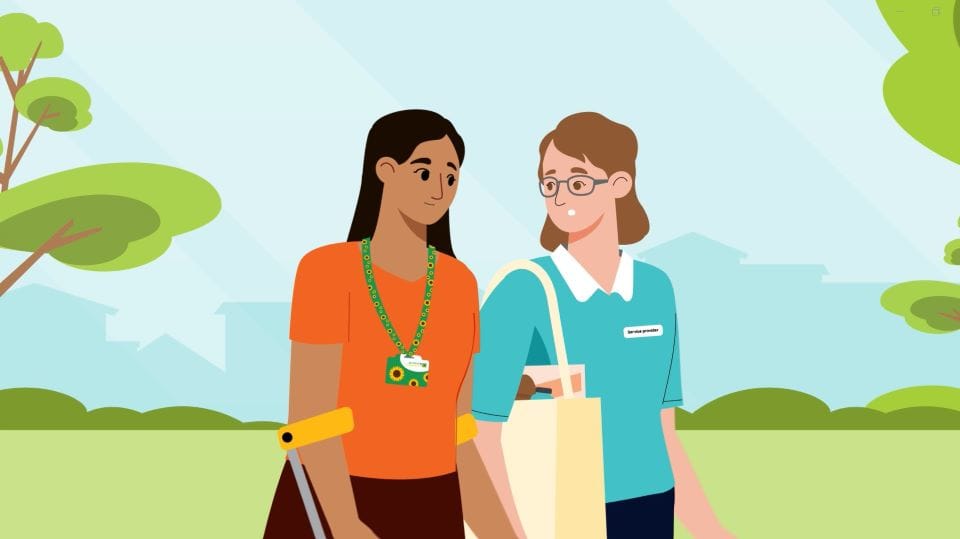
ਇੱਕ NDIS ਭਾਗੀਦਾਰ ਵਜੋਂ ਫੀਡਬੈਕ ਕਿਵੇਂ ਦੇਣੀ ਹੈ | ਤੁਹਾਡੇ ਅਧਿਕਾਰਾਂ ਦੀ ਵਿਆਖਿਆ ਕੀਤੀ ਗਈ ਹੈ
ਇਸ ਐਨੀਮੇਟਡ ਵੀਡੀਓ ਵਿੱਚ, ਜਾਣੋ ਕਿ NDIS ਭਾਗੀਦਾਰ ਆਪਣੀਆਂ ਸਹਾਇਤਾਵਾਂ ਜਾਂ ਸੇਵਾਵਾਂ ਬਾਰੇ ਕਿਵੇਂ ਫੀਡਬੈਕ ਦੇ ਸਕਦੇ ਹਨ। ਸਾਰਾ ਦੀ ਕਹਾਣੀ ਨੂੰ ਇੱਕ ਉਦਾਹਰਨ ਵਜੋਂ ਵਰਤਦੇ ਹੋਏ, ਅਸੀਂ ਤੁਹਾਨੂੰ ਕਦਮ ਡਰ ਕਦਮ ਇਹ ਦੱਸਾਂਗੇ ਕਿ ਆਪਣੇ ਸੇਵਾ ਪ੍ਰਦਾਤਾ ਨਾਲ ਚਿੰਤਾਵਾਂ ਕਿਵੇਂ ਉਠਾਉਣੀਆਂ ਹਨ, ਵਕਾਲਤ ਸਹਾਇਤਾ ਕਿਵੇਂ ਲੱਭਣੀ ਹੈ, ਅਤੇ NDIS ਕਮਿਸ਼ਨ ਨੂੰ ਰਸਮੀ ਸ਼ਿਕਾਇਤ ਕਿਵੇਂ ਕਰਨੀ ਹੈ। ਗੁਣਵੱਤਾ ਦੇਖਭਾਲ ਪ੍ਰਾਪਤ ਕਰਨ ਲਈ ਆਪਣੇ ਅਧਿਕਾਰਾਂ, ਸਮੱਸਿਆਵਾਂ ਨੂੰ ਹੱਲ ਕਰਨ ਲਈ ਉਪਲਬਧ ਤਰੀਕਿਆਂ, ਅਤੇ ਲੋੜ ਪੈਣ ‘ਤੇ ਭਾਸ਼ਾ ਸਹਾਇਤਾ ਤੱਕ ਪਹੁੰਚ ਕਰਨ ਦੇ ਤਰੀਕਿਆਂ ਨੂੰ ਸਮਝੋ। ਜੇਕਰ ਤੁਸੀਂ ਕਦੇ ਵੀ ਅਸੁਰੱਖਿਅਤ ਮਹਿਸੂਸ ਕਰਦੇ ਹੋ ਜਾਂ ਤੁਹਾਡੀਆਂ ਲੋੜਾਂ ਪੂਰੀਆਂ ਨਹੀਂ ਹੁੰਦੀਆਂ ਹਨ, ਤਾਂ ਆਵਾਜ਼ ਉਠਾਉਣ ਤੋਂ ਨਾ ਝਿਜਕੋ —ਮੱਦਦ ਉਪਲਬਧ ਹੈ।
Download resources / ਸੰਸਾਧਨ
Brochure / ਬਰੋਸ਼ਰ
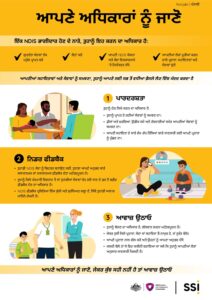
This infographic describes the rights of NDIS participants and outlines how they can give feedback step by step.
ਇਹ ਬਰੋਸ਼ਰ NDIS ਭਾਗੀਦਾਰਾਂ ਦੇ ਅਧਿਕਾਰਾਂ ਦੀ ਜਾਣਕਾਰੀ ਦਿੰਦਾ ਹੈ ਅਤੇ ਦੱਸਦਾ ਹੈ ਕਿ ਉਹ ਕਦਮ-ਦਰ-ਕਦਮ ਕਿਵੇਂ ਫੀਡਬੈਕ ਦੇ ਸਕਦੇ ਹਨ।

